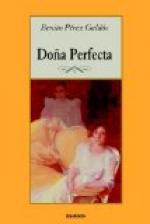Up to a certain time, I believe, Galdos wrote romantic or idealistic novels, and one of these I have read, and it tired me very much. It was called “Marianela,” and it surprised me the more because I was already acquainted with his later work, which is all realistic. But one does not turn realist in a single night, and although the change in Galdos was rapid it was not quite a lightning change; perhaps because it was not merely an outward change, but artistically a change of heart. His acceptance in his quality of realist was much more instant than his conversion, and vastly wider; for we are told by the critic whom I have been quoting that Galdos’s earlier efforts, which he called Episodios Nacionales, never had the vogue which his realistic novels have enjoyed.
These were, indeed, tendencious, if I may Anglicize a very necessary word from the Spanish tendencioso. That is, they dealt with very obvious problems, and had very distinct and poignant significations, at least in the case of “Dona Perfecta,” “Leon Roch,” and “Gloria.” In still later novels, Emilia Pardo-Bazan thinks, he has comprehended that “the novel of to-day must take note of the ambient truth, and realize the beautiful with freedom and independence.” This valiant lady, in the campaign for realism which she made under the title of “La Cuestion Palpitante”—one of the best and strongest books on the subject—counts him first among Spanish realists, as Clarin counts him first among Spanish novelists. “With a certain fundamental humanity,” she says, “a certain magisterial simplicity in his creations, with the natural tendency of his clear intelligence toward the truth, and with the frankness of his observation, the great novelist was always disposed to pass over to realism with arms and munitions; but his aesthetic inclinations were idealistic, and only in his latest works has he adopted the method of the modern novel, fathomed more and more the human heart, and broken once for all with the picturesque and with the typical personages, to embrace the earth we tread.”
For her, as I confess for me, “Dona Perfecta” is not realistic enough—realistic as it is; for realism at its best is not tendencious. It does not seek to grapple with human problems, but is richly content with portraying human experiences; and I think Senora Pardo-Bazan is right in regarding “Dona Perfecta” as transitional, and of a period when the author had not yet assimilated in its fullest meaning the faith he had imbibed.
II
Yet it is a great novel, as I said; and perhaps because it is transitional it will please the greater number who never really arrive anywhere, and who like to find themselves in good company en route. It is so far like life that it is full of significations which pass beyond the persons and actions involved, and envelop the reader, as if he too were a character of the book, or rather as if its persons were men




